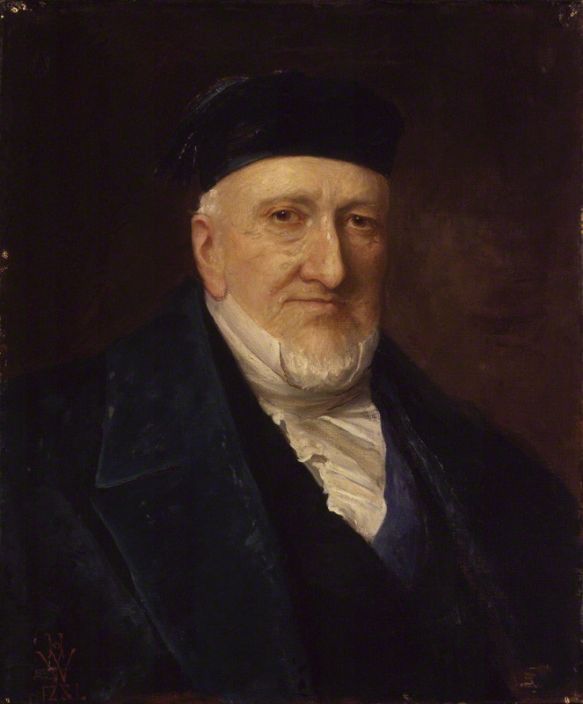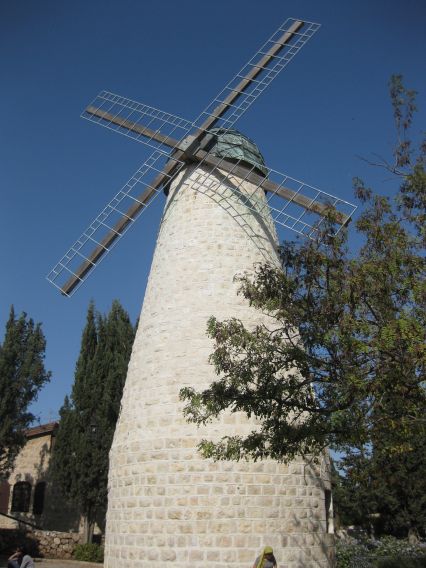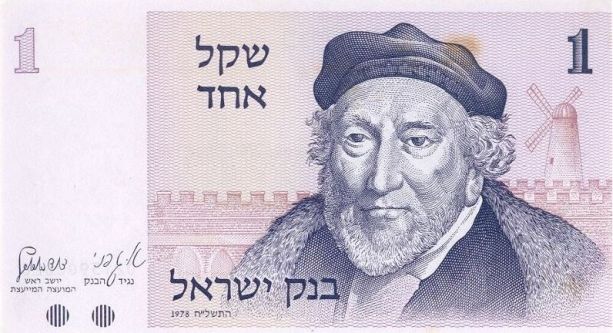| | Features
The Jewish Nation's "Jack of All Trades"
By Y. Aharonson
At age 91

Part II
For Part I click here.
In the first part, we learned of Montefiore's desire, on his trip in 1839, to try to start some sort of light industry for the residents of Jerusalem, to improve their lot.
Fortunate is the man of faith! In order to test his ideas, he acquired a large orchard where various types of fruit trees grew. He then dug a well on the premises, and hired Jewish workers to cultivate the garden. However that was the only agricultural endeavor which took place, for Montefiore's idea was too daring for the Jews of the time, who not only lacked agricultural training, but also feared to cultivate the land that was surrounded by Arab villages.
Montefiore did not despair. Until his final day, he still hoped to realize his plans. When he was ninety, he sent a proclamation to his brethren in Europe, asking them to help implement his plans. His good heart and ayin tovah were still directed toward the Jews of Eretz Yisroel.
"And I tell you, that the Jews of Yerushalayim and those of the rest of Eretz Hakodesh, are more industrious than many Europeans, for if not they could not survive. However, when their labor isn't gainful enough, and when there are no markets for their produce, when starvation, cholera and other calamities befall the residents of the Land, we, the Jews, are bid more than any other Nation, to rally to their aid, and to release them from their distress."
The Land was good. Her Jewish residents were good. However, conditions were difficult. The sole result of his sincere and heartfelt endeavors was Mishkenot Sha'ananim, otherwise known as Yemin Moshe, the first Jewish settlement beyond the limits of the old city, a quarter famed for the flour mill powered by wind which Montefiore built in order to try to provide sustenance and livelihood for its residents. In fact, it never really operated.
The windmill that Montefiore built in Jerusalem that never worked

How To Count The Jews
We have already related that Montefiore was an Orthodox Jew, who observed Shabbos meticulously, and kept all the fast days, his entire life. He prayed three times a day, and was revered by Sephardim and Ashkenazim alike. When he wanted to conduct a population poll in Eretz Yisroel, he was careful not to violate the prohibition against counting Jewish heads. What did he do?
He held rallies in various centers of the Land, offering one dollar bill to whoever attended. Then he listed the names of each recipient and his address. In that way, he managed to prepare an up-to-date roster of the entire Jewish populace, without counting heads.
Such was his meticulous observance of the halacha! One time, though, he innocently transgressed a halacha. However, his conduct, once his error was pointed out to him, proved, beyond a doubt, that he was a true yirei Shomayim.
It is 1855. Montefiore visits Eretz Yisroel for the fourth time. His fame has become widespread, and both gentiles and Jews the world over esteem and admire him. His successes include: foiling the Damascus blood libel and intervening on behalf of the Jews of Russia, Persia and Georgia. He was appointed judge in England and given the title, "Sir."
Was it any wonder, then, that when he arrived in Eretz Yisroel, all the representatives of the British government, accorded him honor due a king?
It is a sweltering day in the month of Av. Nevertheless, nothing can deter the Jews of Yerushalayim from going out to greet their revered guest. Armed Turkish and British contingents accompany the guest. The Jews are delighted that so much honor is accorded to one of their own!
Tisha B'Av in Yerushalayim. All fast and pray beside the Kosel Hamaaravi. Montefiore and his wife mourn the destruction and the downtrodden state of Ir Hakodesh. They have just arrived from Britain's royal palaces, and the luxurious courts of her nobility. The entire city is built up, and only Hashem's abode is in a state of ruin. Montefiore's deep yearning for the glory and grandeur of yore, surge. "Here stood our Beis Hamikdash," he cries out.
Even the Turkish Pasha understands Montefiore's feelings. He has resided in Yerushalayim for many years, and knows which is the holiest site of the Jews. In a rare gesture, he invites the entire contingent to recite shacharis on Har Habayis.
A pleasant and crisp morning sun is shining. Scores of Ethiopians and Muslims head toward the El-Aqsa prayer house. Armed contingents make way for the prominent guests: Sir Montefiore and his wife, the minister and his wife, the consul and his wife, the vice consul and his translator, led by the Pasha of Yerushalayim. Rugs are spread, and the throng watches with a curiosity that is tinged with subtle anger. "How can Jews visit their mosques?" they ask.
But they shake their heads and resign themselves to the situation. Montefiore dries a tear. He is deeply moved by the event, but bereaved over the destruction.
Upon his descent from Har Habayis, Yerushalayim seethes. "Cherem! Niddui!" the chareidim ledvar Hashem cry. The defilement of the dead! It is forbidden to ascend to Har Habayis. The sanctity of the holiest site on earth transcends wealth, prestige and nobility. No one, not even one as preeminent as Montefiore can tread on Har Habayis. And in Yerushalayim of yore—there are very prominent rabbis: R' Yeshaya Bardaki, R' Shmuel Salanter, R' Meir Auerbach. Yerushalayim shel ma'alah!
They decided to summon Montefiore to decide his fate. But will so noble a personage as Sir Moses Montefiore, who rubs shoulders with kings and princes, agree to appear before poor rabbis in order to justify his behavior?
Had he not been Moshe Montefiore, had he not been so G-d fearing, he would have revolted against his detractors. He might even have revenged himself against them, and curtailed their support. Of what importance are the claims of a few Yerushalmi rabbis for a British nobleman?
But Sir Moshe Montefiore was a great man. His reaction to the claims of the rabbis demonstrates his greatness and the extent of his yiras Shomayim.
He appeared before the rabbis of Yerushalayim, and humbly explained himself: "I had no idea that it was forbidden to visit Har Habayis. I simply did not know... My companions deceived me. They thought that it was a pity to forego such an honor, and found various reasons to permit visiting Har Habayis. They said that the sanctity of the Sanctuary no longer prevails today. They told me that the vessels of the Sanctuary are buried deep inside the earth."
It is related that Montefiore agreed to be rebuked. However because of his exalted position, the rabbis decided to drag him across the room while he was seated on a chair, instead of dragging him on the floor, as was otherwise customary. They ruled that he had acted unwittingly, for he had not known that it was forbidden to go up to Har Habayis.
R' Shmuel Salanter and R' Meir Auerbach rebuked the zealots who had sought to excommunicate him, saying that "the tzaddik acted innocently." (Shut Tzitz Eliezer, part 10, siman alef)
And so, Montefiore's deep bonds of friendship with R' Shmuel Salanter and R' Meir Auerbach remained intact until his final days. During that visit, he also renovated Kever Rochel.
However, in Chevron, he was not greeted very warmly, to say the least. Throngs of Muslim zealots who remained silent in fear on Har Habayis, were not silent when the contingents visited Me'oras Hamachpela. With venom, they attacked the multitudes of Jews, and only the soldiers of the Turkish army saved their lives.
Montefiore on Israeli Shekel note in 1978

The Last Visit
Montefiore's seventh visit to Eretz Yisroel took place in 1875. He was ninety years old at the time, and a widower. Although traveling was difficult for him, his journey was motivated by a very important reason. During this period, the maskilim had begun to proliferate in Yerushalayim, and the new winds of "Chovevi Tsion" began to blow. Battles between the chareidim and the maskilim erupted.
In order to defame the chareidim, maskilim publicized in London a degrading proclamation in a style typical of the Haskalah movement. It began with the words: "All the filthy Jewish beggars, who do not do not want to work, and oppose reforms and innovations..."
Another person might have accepted these defamations at face value. However, the aged Montefiore still had faith in the saintly Jews of Yerushalayim, and it was the city's poor and Torah observant Jews whom he cherished. As a result, the ninety-year-old nobleman came to Yerushalayim to observe the situation firsthand, and to judge accordingly. Like Yehoshua and Calev, he saw only good in the residents of Ir Hakodesh.
A description of all of his debates with the maskilim could fill an entire newspaper. We will only present a few excerpts from an "Open Letter," displayed in Yerushalayim's streets in his honor, and signed by such great rabbonim as R' Shmuel Salant and R' Meir Auerbach. This brief excerpt, though, reflects some of the ambience of the era:
"Welcome, the great minister, a tower and fortress, a tzaddik and an upright man of glory... Blessed are you to Hashem, Moshe, the servant of Hashem... and now, minister and prince of our Land... As a father loves his sons, so do you love the dear children of Tsion... We ask your honor to judge accordingly, for we trust that through you, [our hopes will be fulfilled.]"
Earlier Battles With Maskilim
In Russia, in 1846, Montefiore was nearly ensnared. However, the verse, "G-d watches over the [innocent]," and his uprightness and honesty protected him from becoming involved in the battles with the maskilim.
The Haskalah was a messy affair! Battles within, battles without: battles against the authorities, battles with fellow Jews.
Will the Haskalah improve the economic status of the Jews, or will it cause it to deteriorate? Will the Haskalah reduce animosity toward traditional Judaism, or will it incite it? Will exposure to European culture aid the Jews or increase already existent tensions? Burning questions such as these occupied the minds of Europe's Jews. Of course, the main question was: is any sort of association with maskilim permissible? This major problem overshadowed all other questions.
The Russian government played also in the game according to her own set of rules and internal and international interests. It is quite easy to compare the political situation of that period, to Russia's situation in the nineties. The Soviet Glassnost of five years ago, and the "liberal" attitude toward the Jews, of the mid-nineteenth century, surely do not stem from ahavas Yisroel. Today, invitations to Israeli representatives are sent for subtle political reasons, and often are fronts to mask political intrigues. The Russians are interested in cultivating friendly relations with America, for example, and believe that by making conditions better for the Jews, America will make things better for them.
So, in the mid-nineteenth century, the Russians sought to cultivate amicable relations with Great Britain. Correspondingly, they also hoped to influence the Jews to accept the ideas of the Haskalah Movement, and to expose them to Western culture. "Hava nischakma lo! If the edicts fail to subdue them, and persecutions do not shatter their spirits, perhaps assimilation will break them," they assumed.
What is more, Jewish maskilim relished collaborating with the government, or so Prince Oberov, Russia's minister of education, presumed when he said:
"The better Jews (the maskilim) feel that one of the main reasons for their degraded state lies in the distorted interpretations Orthodox Jews offer in order to justify their religious beliefs. This influence can be eradicated by the Haskalah, and the government can only function in the spirit of the small group of the cream of Judaism..."
Meanwhile, the situation of the Jews was not good. They turned to their loyal ambassador, Montefiore, and asked him to approach the Czar.
Montefiore did not hesitate. He complained to the Russian Czar, and was very angry. The Russians, though, were happy with the letter. They hoped to kill two birds with one stone. They invited Montefiore for a visit as both the representative of worldwide Jewry and as the unofficial ambassador of Britain. In that way, they hoped to improve their diplomatic relationships, to refute the impression that the Jews under their rule are tortured, and to generally encourage the maskilim,, for they did not regard Montefiore as a "dark age" Jew.
And so, Montefiore packs his belongings and sets out on the journey. It takes more than a month to journey from England to Russia. When Montefiore arrives, he receives a royal welcome from Czar Nikolai. As soon as he arrives, he demands that the Czar rectify the situation of the Jews. Afterwards, he tours Russia, and meets Jews of all types. He manages not to support the Haskalah, but rather expresses concern over the difficult situation of the Jews. The pure and noble-spirited Montefiore has come for only one reason: to help the Jews.
"I was greatly pleased in hearing from everyone that my visit to Russia will generally raise the status of the Jews in Russia."
However, fortune did not shine long for the Jews of Russia. In the eyes of the Russian authorities, the Jews were always perfect scapegoats, perfect targets for blood libels. The blood libel of Georgia is a prototype of blind hatred and diplomatic hypocrisy of the worst kind.
David G'anashvili, Gavriel G'anashvili, Rafael G'anashvili, Yisrael G'anashvili, Michael Kizashvili, Eli Pitzchadzah, Avraham G'ing'iyachashvili. On the thirteenth of May, 1853, these men were accused of murdering a Christian child in order to draw blood from his body for religious reasons. They were sentenced to Siberia, each to be exiled to a different place. Two more men had already died in prison.
In the original investigation, the authorities declared that no signs of violence had been found on the dead child's body. Pressure from "above" caused this version to be officially altered. Crucial evidence in the trial was supplied by two young Jewish girls: one was six and the other eleven years old.
It is 1851. When the scandal first broke, the Jews of Georgia still recalled the exciting visit of Moshe Montefiore to Russia only a few years earlier. They turned to him with an urgent plea that he secure the release of the accused and cancel the libel. Montefiore was ready to come again, but the urgency of the matter caused him to write a letter to Prince Vernochov, the ruler of the region. Although this letter was "friendly," it was also pressuring.
"I would never dream of attributing to one as noble and kind as you, collaboration in such a matter. However, to the same degree, I am certain of the innocence of my poor coreligionists, and know how easy it is to persuade people to believe in blood libels, and how they spread like plagues. Therefore, with all due respect to you, I plead that you conduct a broad and thorough investigation."
The Prince offered an evasive reply, in which he indirectly accused the Jews of the libel: "I would love to uproot the false idea, from one as noble as you, that we torture the accused Jews... With all due respect, Vernochov."
Thanks to Montefiore, the Jews were not sentenced to death, but only sent to Siberia. However, in an ensuing letter which the Prince sent to his replacement, he asks whether the sentence was executed because, "I learned that the Jews indeed murdered the child, and it is pity to leave them in our environs, and just to rely on the efforts of police. Their very presence is distressing to Christians."
Romania
"You can shoot me, if you wish! I have come here in the name of justice and in the name humanity, to protect innocent people who are suffering for no cause."
That was the cry of the fearless octogenarian from the window of his hotel in Bucharest, in 1866 to the angry crowd gathered below.
Montefiore had come to rescue his suffering people, and how could he defer to the gentile masses. He rented an open carriage, and drove with it through the streets of Bucharest, visiting all of its Jewish institutions. Of course, the British government supported him, and the Prussian government intervened. However, he who acted, was Montefiore. He had heard that pogroms and persecutions were erupting, and had come to help.
His one-hundredth birthday, in 1884, was the occasion for an outpouring of gratitude and recognition from Jews the world over. How can we define the greatness of this remarkable Jew? He was not of Ashkenazic descent, nor of Sephardic descent. He was not a maskil or a chossid. He was not a scholar. He was not a Zionist, but an ardent lover of Tsion. In summary, a Jew who had a warm heart—no small compliment.
|




